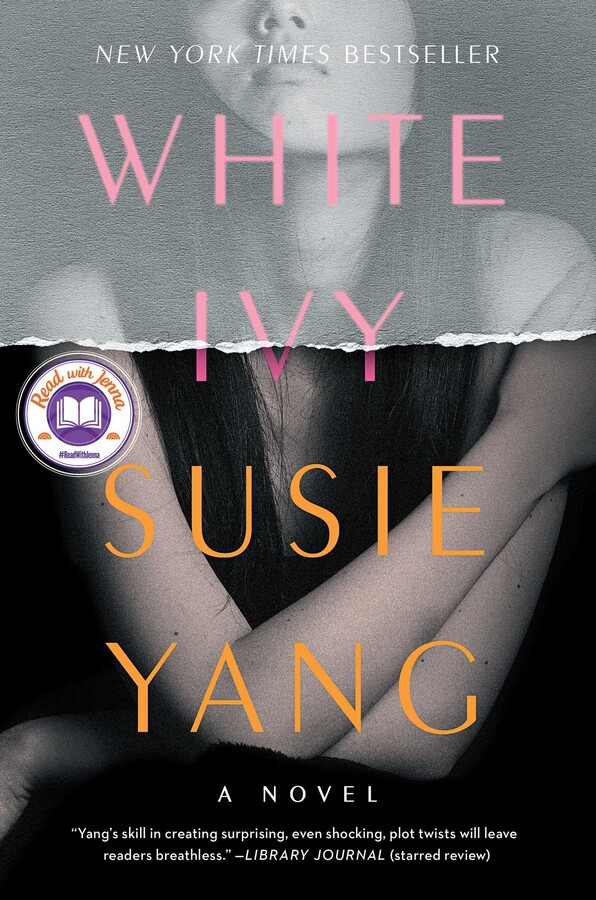Written by Susie Yang
November 3rd, 2020
368 pages
ISBN13: 978-1-98210-059-9
Susie Yang’s ambitious debut novel White Ivy is the story of a young Chinese American woman’s unwavering, lifelong obsession with wanting it all. Ivy Lin, the eponymous anti-heroine, reluctantly leaves her grandmother and her hometown of Chongqing, China, at the age of five to join her parents and her new brother in an unsatisfyingly humble life in Massachusetts. Like many who move to a new country at an early age, she never quite feels at home, though her feeling of otherness is intensified when she transfers to a prep school in sixth grade tuition-free, a perk of her father’s new job at the school. It is there where she meets Gideon Speyer, the white golden boy senator’s son, and she longs to be the type of girl he could love.
After Ivy’s parents discover that she has spent the night at a chaste co-ed birthday sleepover at Gideon’s, they send Ivy back to China on her own to visit relatives during the summer in a thinly veiled attempt to reprogram her behavior. In her brief absence, her family moves to New Jersey, which forces her to experience her high school years away from the idyllic north upon her return. She later chooses to attend college in the Boston area, which almost seems to have mythicized into her own personal Xanadu, and settles there after graduation. An unexpected run-in with Gideon’s sister gives Ivy a second chance at what had previously seemed entirely unattainable: a relationship with Gideon and entrée into a seemingly glamorous world. The bulk of the novel witnesses her mounting, self-imposed pressure to claim all that she believes to be hers at any cost, with little regard to the often irreversible damage left in her wake. In short, there’s going to be a lot to discuss at the book club.
While the novel certainly has mass readership appeal (in fact, it was selected as one of Jenna Bush Hager’s book club picks upon its release last fall), Yang is particularly adept at exploring tropes that are commonly found in Asian American literature, but in a fresh, modern, and relatable way. Model minority stereotypes are challenged. Early in the novel, in an attempt to save money, Ivy’s cunning, out-of-work grandmother enlists the impressionable Ivy on petty theft crime sprees. She teaches Ivy how to swap sticker tags at the Goodwill just to get the slightest discount and how to brazenly sneak valuable items into a backpack at yard sales. This tutelage in deception influences most of Ivy’s questionable decision making going forward.
The characters in the novel also experience cringe-worthy microaggressions that would not be implausible in real life. At a party, Gideon’s white mentor mentions that Ivy and his Chinese wife could be sisters, and upon learning that Ivy can speak some Mandarin, he demands that she “say something”. During a dinner party, Gideon’s mother tells Ivy that her younger brother, who has an interest in computers, “will make an incredible engineer”. The title of the novel is especially fitting, as White Ivy could arguably be read as a cautionary tale of the frighteningly desperate depths that a woman of color feels must be reached in order to fully assimilate into white American society. However, Ivy’s chaotic journey may at times feel weary for the reader, as it can be difficult to empathize with an unlikeable character who often displays sociopathic tendencies.
White Ivy is overall a gripping thriller that probes identity issues and the challenges of interpersonal relationships with intoxicating detail. APALA readers are likely to appreciate this ominous version of the Asian American dream and may find that the family dynamics in particular hit very close to home. Aficionados of the “Gone Girl genre” will be hooked to this crosscultural rollercoaster ride.
A note for those who prefer eBooks: the hardcover edition of White Ivy has a striking dust jacket that you will probably want to run your fingers over at least a few times, as well as gorgeously vivid chinoiserie-esque endsheets, so you will definitely want to get your hands on a physical copy.
Review by Amanda Cheung. Editing assistance by Danica Ronquillo.

